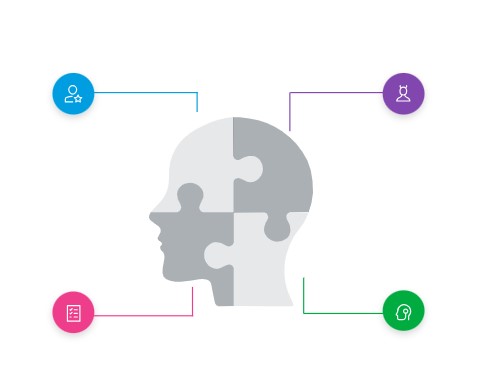Since the pandemic came to a halt a few years ago, the corporate environment has evolved and modernized its strategies. Due to the ever-changing improvements in this VUCA world, all structures, including employment decisions, have to be re-run from the bottom up. Every organization is looking for someone who fulfills the job designed to achieve a specific objective. The post-pandemic era has reinterpreted these responsibilities to attain the desired results. A clear differentiation in the role makes the search more targeted, and a psychometric exam can help map the candidate to the role.
Purpose of Psychometric Tests
Skilled interviewing is required to guarantee that psychometric tests are used effectively and test scores are interpreted in light of the individual’s context and background knowledge. Psychometric tests are employed in selection because they predict how well a candidate would perform in a specific job function. For example, if you’re seeking for a position as a sales representative, an aptitude test that assesses your ability to understand statistics and acquire new concepts fast can be useful. This is because these abilities are necessary for success as a salesperson.
There is no one-foot rule for evaluating all qualities of a candidate, including aptitude, ability, attitude, knowledge, skills, and personality. Let us examine some of the parameters of these tests:
1. It allows the interviewer to objectively assess the candidates.
It standardized the interview procedure based on the role’s criteria. Ability and aptitude tests can measure candidates’ talents and potential for the profession, whereas personality tests assess the characteristics and attributes that will help them perform.
2. Psychometric tests provide quantifiable results.
Individuals are evaluated against an objective criterion, so there is no direct comparison or competition among applicants. This is why psychometric assessment are more trusted and depended on than any other interview selection approach.
3. It assists in addressing the various stages of the interview process.
These examinations analyze a variety of settings, from shortlisting applications to evaluation centers. Psychometric tests allow interviewers to acquire a more objective picture of a candidate’s profile, particularly their personality and behavioral habits. Their skills, developmental requirements, and working style emerge when the exam is administered in accordance with the job description.
4. Choose the right psychometric test that best serves the purpose.
A key prerequisite for conducting psychometric tests for interviews is to select the proper test based on the role and requirements, rather than simply selecting one. Defining the significance of the results in terms of the role’s competences; for example, not all higher scores reflect a correspondingly better profile.
5. Ensure successful results of psychometric exams.
Candidates may become nervous during the interview stage, which includes any psychometric tests. When it comes to responding to these tests, there’s no need to hunt for a “right answer” or workaround. They can certainly expand their knowledge and abilities linked to their work or subject of interest; nevertheless, they should never fall into the trap of making a good impression or responding well to a psychometric exam.
For starters, their efforts to establish a “liked by all” image would be futile because it gives the wrong idea of their intentions; an honest reaction is essential in this situation. Second, there are psychometric tests with questions designed to assess this type of response. As a result, a genuine response ensures a precise profile and a clear comprehension of the individual.
The interviewer might address the candidate’s fears by debriefing them prior to administering any psychometric exam. To ensure an effective outcome while employing psychometric tests for interviews, one must approach the situation from a larger viewpoint, focusing on several parts of the process.
Finally, don’t forget to provide feedback on the report after the interview process is over, as this is critical to increasing the credibility of the process and ensuring candidates, whether picked or not, are aware of their profile.
Importance of Psychometric Tests
While there are an infinite amount of job seekers in today’s labor market, it remains difficult to locate highly competent individuals for your firm. It has become increasingly difficult to distinguish between skilled and unskilled individuals.
Psychometric tests are in place to make this procedure more easier, bring an objective approach to the recruitment process, and assist in making scientifically sound decisions. It enables businesses to evaluate the skills and competencies of candidates. It assists them in determining whether the prospect is a suitable fit for their company or not. These exams provide a more in-depth insight of how a candidate will react in the job and how well they will do based on their skills.
Depending on the job role, many types of psychometric evaluations can be used.
For example, a sales job would focus on evaluating the candidate’s interpersonal abilities.
Using Psychometric Exams Can Lead to:
Reduced hiring costs.
Increased employee retention.
Recruiting takes less time, leading to increased output.
Better hiring decisions.
What is Measured by a Psychometric Test?
Psychometric exams are used to assess a number of characteristics in a candidate based on the work requirements.
Aptitude tests measure candidates’ aptitude levels. These online personality test are used to evaluate candidates’ ability in a variety of disciplines. The talents measured include numerical aptitude, verbal capacity, spatial awareness, and so on.
Personality tests are used to evaluate the personality attributes of candidates. It assists employers in understanding how a candidate would react in a given situation.
Interest tests analyze what inspires people and what interests them.
Behavioral tests: These tests are designed to assess a candidate’s behavioral qualities. It aids in understanding the skills required. When applied correctly, these techniques provide the hiring manager with an unbiased assessment of the candidate. In fact, psychometric tests can be far more beneficial than a basic resume or one-on-one interview since they provide objective and unbiased indications of a candidate’s probable match with a job description. Mercer | Mettl enables organizations to recruit talent that is not readily obvious on paper or in person. Instead of depending on gut sentiments or first impressions, companies can use data-driven insights to identify individuals with the highest potential for success within their organization.
Also Read: When conducting research, why should you rely on scholarly journals?


